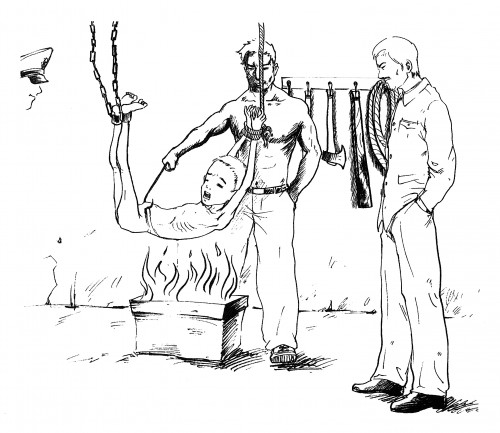Di Caterina Poli
Questo è il discorso che ho realizzato come compito per la mia classe di inglese nel primo semestre: dovevamo scegliere un tema a noi a cuore e preparare un discorso di 5 minuti così io ho deciso di parlare dei campi di concentramento e di internamento in Corea del Nord.

BECAUSE WE HAVE LEARN THE LESSON, RIGHT?
Speech by Caterina Poli
You who live safe
In your warm houses,
You who find, returning in the evening,
Hot food and friendly faces:
Consider if this is a man
Who works in the mud
Who does not know peace
Who fights for a scrap of bread
Who dies because of a yes or a no.
Consider if this is a woman,
Without hair and without name
With no more strength to remember,
Her eyes empty and her womb cold
Like a frog in winter.
Meditate that this came about:
I commend these words to you.
Carve them in your hearts
At home, in the street,
Going to bed, rising;
Repeat them to your children,
Or may your house fall apart,
May illness impede you,
May your children turn their faces from you.
It’s the 1945, the war just ended, when Primo Levi, an Italian Jewish chemist and
writer survived in Auschwitz writes those words; words that more than a poem
sound like a course; a course to everyone, every single human being who would
have ever tried to forget: an admonition to every future generation so that such a
mistake would have never be repeated again.
And we have learnt, right? From our mistakes…
I mean… every year history teachers teach their students about the war, about the
dates, 1939-1945, about the tragedy of the Holocaust, about the amount of lives
lost in the battlefield or blown away in the wind throw a chimney. Every year on
January, the 27th, we commemorate the Genocide, those lives, those millions of
names that don’t belong to anyone anymore, just numbers instead, just dust and
ashes in the wind. Every year, even if just for one minute, we remind ourselves to
not forget.
Because we have learnt the lesson, right?
So, if I ask you “When was the last concentration camp?”, you would all know the
answer, you would all raise your hand and say all together, in unison: “1945”, am I
right? Well, maybe someone- the overachiever of the class- would disagree,
punctualizing that “actually the gulags in Soviet Union survived until 1953”, but
-and I’m truly truly sorry to disappoint you- for once, neither him would have given
the right answer to my question: “When wa the last concentration camp?”
The same question I myself would have answer wrong until four years ago.
The same question my entire class answered wrong four years ago during a literary
meeting: there was this lady, supposed to present us this book – “Escape from
camp 14”- with a sad smile on her face, aware of our innocent ignorance she was
going to destroy in a couple of minutes. But instead of talking about the plot, she
invited us to switch on our smartphones, open Google Maps, or Earth, or whatever
and insert those coordinates:
LATITUDE 39.708276
LONGITUDE 125.923276
A one way trip to North Korea.
Panorama? A building from above: 300 metres long, 300 metres wide, surrounded
by 4 metres high walls with barbed wire on the top.
It’s called Kaechon Concentration Camp, Kyo-Hwa So No. 1; and as there is a No. 1
there is also a No. 3, 5, 6…
In those Long-Term Prison Labour Facilities or, as the third North Korean “Leader
sent from Heaven” likes to call, Re-education Camps, are detained for criminal or
political offences, those fortunate prisoners who, after a usually fixed period of
time, after months or years of starvation, forced labour, inhuman conditions, if
they behave as they “should”, can hope in a release: that’s why “fortunate”,
because at least they have hope.
Because, instead, if from Kaechon Kyo-Hwa So we move 20 kilometres to the
south-east, we’ll end up in another camp: Kaechon Kwan-Li So No. 14, that despite
the similar name is not to be confused with the previous one.
It is not a Kyo-Hwa So, but a Kwan-Li So.
Not a concentration camp, but a internment camp.
Not a Long-Term Prison, but a Political Penal Labour colony.
Here there are not re-educable prisoners, but irredeemables, whose blood is so
contaminated that must be eliminated through three generations. Three
generations condemned to be born, raise and work to death: no release, no
escape, no hope. Except for Shin, the first and the only survival, the only story we
have from inside that Earthy-hell he was used to call home. The only home millions
of other people will have ever had.
A horrifying scenario. But even more horrifying is the world’s indifference.
We are always wondering how people in the World War II could pretend to not
know… Well, North Korea’s labour camps have been there since the ’50s: a 60/70
years old existence, as long as double the Soviet Gulags’ and 13 times the Nazi
concentration camps’.
So maybe it’s time to start wondering what the next generation, our sons and
daughters, will think about us, their parents, staring at satellite photos of camps
North Korean government refuse to admit the existence, and doing nothing.
Thanks.